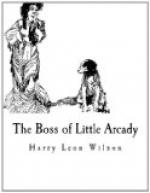There were moments in which I made no doubt of all this. But I fought them off as foolishly as did Jim his own intervals of clear seeing. Sometimes in a half doze he breathes a long, almost human sigh of perfect and despairing comprehension, as if the whole dead weight of his race’s history flashed upon him; as if the woful failure of his species to achieve anything worth while, and the daily futilities of himself as an individual dog were suddenly revealed. In such instants he knows, perhaps, that there is little reward in being a dog, unless you cheat yourself by believing more than the facts warrant. But presently he is up to dash at a bird, with a fine forgetfulness, quite as startled by the trick of flight as in his first days. And I, envying him his gift of credulity, weakly strive for it.
As I have said, I had noted that in these free dreamings of mine the painted face above my neighbor’s mantel seemed to have had a place long before I looked upon its actual lines. This perplexed me not a little; that the face should seem to have been familiar before I had seen it—the portrait, that it should have blended with and then almost replaced another’s, so that now the woman face I saw was eloquent of two, though fittingly harmonized in itself. Must I lay to the philter’s magic this audacious notion; that the face of Little Miss had tangibly come to me in some night of the mind? Sober, I was loath to commit this absurdity; but breasting drunkenly that tide of dreams, it ceased to be absurd.
And so I had plunged into the current again one early evening when the growing things seemed to have stopped reluctantly for rest, when the robins had fluted of their household duties the last time for the day, and when only the songs of children at a game were brought to me from a neighboring yard.
Unconsciously my thoughts fell into the rhythm of this song, with the result that I presently listened to catch its words—faint, childish, laughing, yet musical in the scented dusk:—
“King William was King James’s
son and from the royal race he sprung;
Upon his breast he wore a star that showed
the royal points of war.
Go choose your east and choose your west,
and choose the one that you
love best.
If she’s not here to take your part,
go choose another with all your
heart.
Down on this carpet you must kneel, low
as the grass grows in yon field.
Salute your bride and kiss her sweet,
and then arise upon your feet.”
The sentiment was ill suited to my own at the moment, but the raw-voiced little singers appealed to my ears not unpleasantly. Again the verse came—
“If she’s not here to take
your part—go choose another with all your
heart!”
I heard wheels then, nearer than the singing,—the clumsy rumble of our big yellow ’bus. Voices were borne to me,—Clem’s voice, Miss Caroline’s and another not like her’s, a voice firmer, yet a dusky-warm woman’s voice. That was all I could think of at the time: perhaps the night suggested it; they had qualities in common. It was a woman’s voice, but a determined woman’s. I knew of course that Little Miss had come. But also I knew at once—this being her voice—that it would not be in my power to call her Little Miss.




